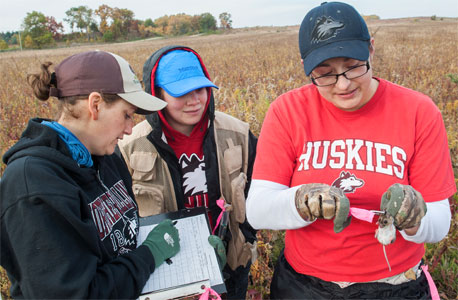
The wild bison herd at Nachusa Grasslands is the first herd
reintroduced for habitat restoration purposes east of the Mississippi River.
Most of the Midwestern tall grass prairie vanished in the 19th century with the rise of the steel plow, but researchers say that prairie restoration is essential for maintaining native plant and animal habitats, improving water and soil quality and reducing erosion.
Here in Illinois, NIU professors are fighting to save the prairie ecosystem at Nachusa Grasslands – and they have enlisted bison as collaborators.
At 9 a.m. Saturday, Aug. 29, two of those professors, Holly Jones and Nick Barber, will describe the efforts to restore Nachusa’s tall grass prairie in STEM Café’s “Breakfast with the Bison” event in Oregon.
This special morning event will begin at NIU’s Lorado Taft Field Campus (1414 N. River Rd, Oregon, Ill.), where Barber and Jones will give a talk on why tallgrass prairies have diminished, why it matters,and what it will take to bring them back. They will focus on the Nachusa Grasslands, where NIU researchers measure how plant, animal and microbial life responds to different restoration techniques, including the recent reintroduction of a herd of wild native bison.
A breakfast buffet, which will include Lorado Taft’s famous cinnamon rolls, will be available for purchase for $10. To help Lorado Taft prepare enough food for breakfast, contact Judith Dymond at (815) 753-4751 or jdymond@niu.edu to report number in your party.
At 10:30 a.m., the group will travel to Nachusa Grasslands to tour the area, view the bison and enjoy self-directed hiking.The formal activities will end at noon, after which visitors will be able to continue exploring on their own, taking in a vast diversity of prairie plants and flowers, including the spectacular Shooting Stars, Golden Alexanders, Pink Milkworts, Yellow Coneflower, and Wild Indigos
Anyone who thinks of prairies as flat and boring is in for a surprise, Jones says.

Professor Holly Jones and NIU graduate students Heather Herakovich (center)
and Angela Burke (right) turn the Nachusa Grasslands into a living laboratory.
“It takes thousands of animals and innumerable microbes to have a healthy tallgrass prairie. Bringing that diversity back requires enormous effort and commitment,” she says.
The wild bison herd at Nachusa is the first herd reintroduced for habitat restoration purposes east of the Mississippi River. Their presence should naturally increase the local biodiversity, helping to restore the health of the ecosystem.
“Our research is trying to answer several questions,” Barber says. “How do bison affect the plants and animals? Do other animals and organisms return after a prairie is replanted? Do these restored prairies function like the native prairies that historically existed in the Midwest? What makes a restoration ‘successful?’ ”
Barber and Jones will also talk about how local citizens can get involved, whether by joining Nachusa’s army of volunteers, growing native plants in their gardens or creating “way stations” for monarch butterflies in their backyards.
Both Barber and Jones are assistant professors in NIU’s Department of Biological Sciences and associates at the Institute for the Study of the Environment, Sustainability, and Energy. Barber, an ecologist, studies communities of plants and animals and how they interact in nature. Jones focuses on restoration, researching ways that degraded or destroyed ecosystems can be repaired.
This event is part of NIU STEM Outreach’s series of monthly STEM Cafés, all of which are free and open to the public.
The STEM Café series is just one of the many engaging events STEM Outreach hosts throughout the year to increase public awareness of the critical roles the STEM fields of science, technology, engineering and math play in everyday lives. For more information, call (815) 753-4751 or email jdymond@niu.edu.
